By Daisy Chen
As the Wikimedia Foundation’s Growth and Editing teams were respectively making plans and progress on Newcomer features and Talk Pages in recent quarters, the teams were curious about where and how wiki users are communicating with one another, and how mentorship manifests within the communication ecosystem. As a first step in this process, Product Design Strategy completed an initial round of research with a participant cohort of primarily affiliate group members, Foundation staff, and other long-time volunteers to illuminate the communications/mentorship ecosystem and identify areas of potential future study.
What we wanted to learn
While the Growth and Editing teams wanted to keep the research and discovery process open-ended, they both had some goals in mind for their respective teams’ work. The Growth team hoped the research outcomes would inform the mentorship and collaboration opportunities being tested in the Newcomer program initiatives. The Editing team wanted to understand use cases, benefits and impacts of various communication channels being utilized and how that might feed their work on Talk Pages and New Discussion Tool. Both teams felt this research would impact ongoing work and future plans around communication features/support and mentorship/collaboration opportunities, and we jointly created a couple grounding sets of research questions to that end:
Communications
- What are the various communication tools used by different communities to have these discussions?
- What types of work are done on these channels?
- How do community members communicate besides on wiki (ie., besides Talk pages, Village Pump, etc) across different language wikis?
- What are the motivations for using on and/vs off wiki channels? What are the benefits and tradeoffs of each?
- Why are these tools used instead/as well, and what are their efficacies as effective/positive communication tools?
Mentorship
- How is mentorship defined? What does it look like on the ground?
- What factors influence mentorship motivation? How can users be encouraged to mentor others, and see their impacts?
- How has/does communicating with other contributors affect newcomers’ understanding of Wikipedia as a community of people working together and their connection to it?
- What is the efficacy of the off wiki channels specifically in attracting and fostering new contributors?
- How can productivity tools that promote collaborative editing/communication/tracking, potentially integrated on wiki, also affect mentorship effectiveness?
Our research participants and process
To contain the scope of this initial round of research (with a second round envisioned to expand our research into other segments), we decided to keep our first participant cohort to those who have had more experience working in the various wiki communities. These folks worked in a wide range of wiki-related roles both in various organizational and volunteer capacities; the goal was to hear about their communications and mentorship experiences at length. Interviews were conducted in English.
A few target languages/regions came into focus after reviewing geographic areas of interest the Growth and Editing teams pinpointed and where ongoing recruitment of potential participants seemed to be proving most fruitful. Ultimately, the participants were determined after evaluating languages, regions and genders represented, and diversity of roles within the wiki movement, among other factors. The languages/regions in particular were determined when we were able to establish a ‘critical mass’ of sorts, where we spoke with enough participants in each to start observing patterns in their responses and experiences.
We concluded the project with 18 participant interviews across 4 primary geographic regions. Each of the interviews were semi-structured, with a prepared discussion guide to provide a basic framework for the exploration while allowing for the participants to freely express both directly and tangentially relevant experiences and feedback.
| Primary Location | Country(/ies) | Language(s) | # participants |
|---|---|---|---|
| South America | Brazil, Portugal* | Portuguese | 3 |
| Southeast Asia | Indonesia, Philippines, UK* | Bahasa indonesian, Nias, Bikol, Tagalog, Pangasinan | 6 |
| South Asia | India | Hindi, Bengali, Punjabi, many other Indic languages | 5 |
| MENA/T | Turkey, Jordan, Morocco | Turkish, Arabic | 4 |
* grouped with South America due to work on same language wiki
What did we discover in these conversations?
Communications
Devices and access. Even given the characteristics of this cohort (juggling a wide range of audiences and channels both on and off wiki, high volume of communication, high relative access to digital resources), none of the participants indicated that they used their mobile as a primary device for their communications. Many indicated that laptop/desktop access made many tasks easier to accomplish as some on wiki tasks are not yet mobile-friendly or lack appropriate functionality (in addition to inherent screen and device limitations). Laptop/desktop use was also convenient as many classically mobile tasks (texting, sending images, calling) are increasingly available from a desktop version.
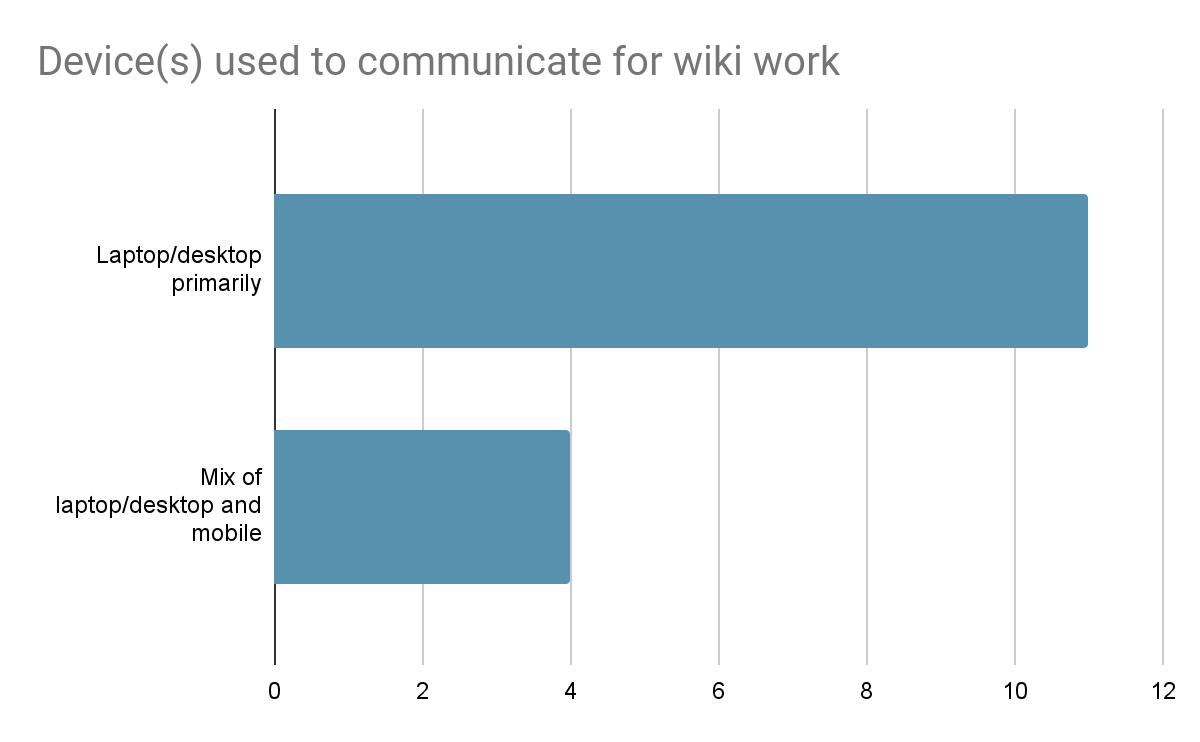
Even though this is the direct finding from this cohort, many from the cohort broached the issue that many existing and potential users, especially from the Southeast Asia and South Asia (India) regions, are facing device/digital resource limitations. They may face inconsistent internet infrastructure/access, limited/expensive data, and limited access to devices (no/shared access to a singular mobile device, paid entry to internet cafes with device access). To address this, optimizing our mobile experience in terms of accessibility/reliability and additional features while limiting bandwidth used where possible is key to reaching this audience further.
On or off wiki communication? This cohort bucked expectations again here; even though their wiki communication is heavily due to a wiki-related role/obligation and their individual capacities as volunteers, they tended to do most of the communication off the wikis. Those who utilized on-wiki communications more often indicated they did so primarily for posting official updates and documenting conversations and outcomes.
Participants often strategically move conversations between on and off wiki channels, most specifically moving discussions to off wiki channels and then returning on wiki to document the outcomes and decisions from those discussions. The reasons given for moving discussions off wiki included:
- expediency (having the discussions was logistically quicker to do on off wiki channels)
- Wider reach/more inclusive (more people quantitatively in general and more were engaged in the conversation than on on wiki alternative arenas)
- more availability for private or otherwise sensitive conversation as needed (everything on wiki is visible for anyone)
Finally, many participants empathetically said that being on wiki is a “disadvantage” and an “inequality”, especially for newer users. The learning curve overall, the invisibility of accessing help and finding communication channels, understanding the norms of communication in each wiki community – all contribute to why the cohort as a rule tends to try and meet newer users where they are, which is most often an off wiki channel.
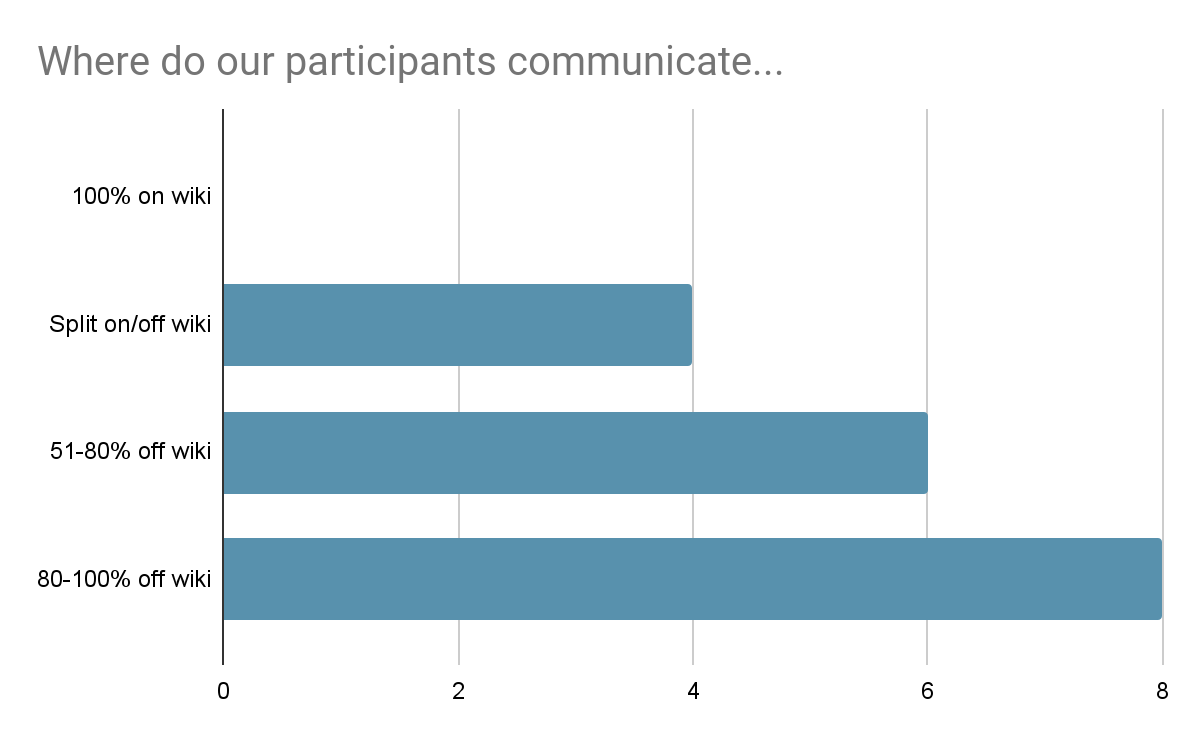
On and off wiki channels. Below you’ll find examples of channels being used both on and off wiki, an approximated scorecard of the pros and cons of the two main options, and basic flow charts of the most common use cases.
Main takeaways: off wiki channels score higher on all listed criteria for our participants and provide the most helpful outcomes when it comes to the tasks and connections they need to make in their wiki work.
Off wiki channels as a whole offer:
- quicker responses
- more casual feel that can lead to more sincere communication
- option for private conversations
- better accessibility and mobile/UI-friendly
Where does off wiki communication fall short as a category? The regard for on wiki legitimacy remains; it is a must for announcements, recording of important decisions and outcomes, and everything posted is public, documentable, and referenceable. The transparency and accountability on off wiki options are not as clear cut.
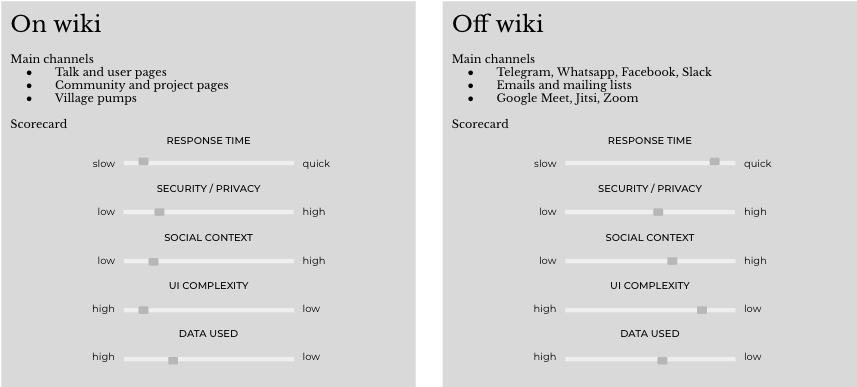
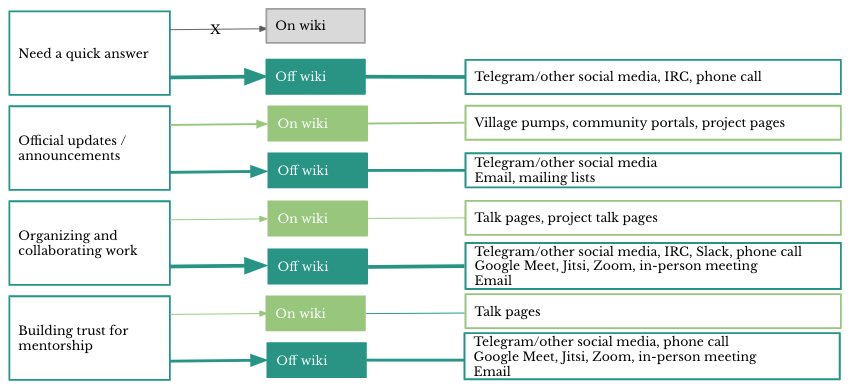
What do participants think could improve communication? The participant suggestions below are charted on a continuum of simple to execute (left/green) to the more complex (right/red). They are also sorted into suggestions that could impact communications more directly (top half) and changes that have more of an indirect impact (bottom half).
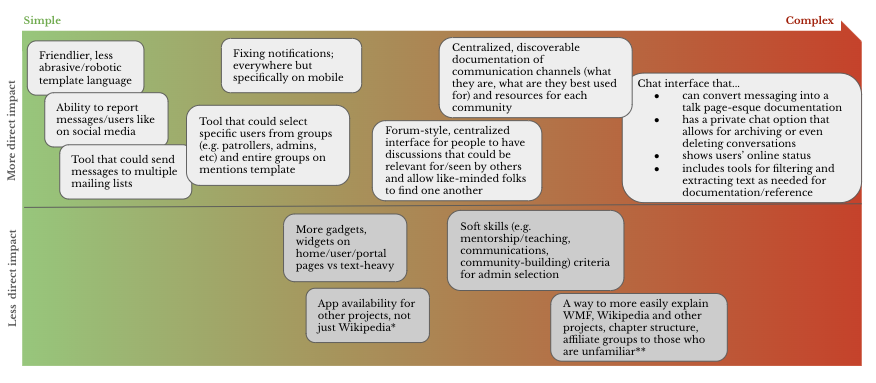
Mentorship
Mentorship as described by many participants is transactional and editing-centric. A few members of this cohort, while tackling task-based, editing-focused questions, have also emphasized and lived the importance of additional facets of a mentorship relationship. Moving forward, we should support a tailored approach to mentorship, one that spans the transactional/functional (knowing what/how to do) to the institutional/inspirational (understanding of the movement, engagement borne of interest, belonging and recognition).
“We need longevity and sustainability from good mentorship. Do we want 1 person who edits 100 times or get 10 people to do 10 edits each?”
Within this framework, we’ll also need to address our users’ varying needs. While facilitating “human-powered” means of mentorship interactions, we should also take care to supplement learning with technical solutions.
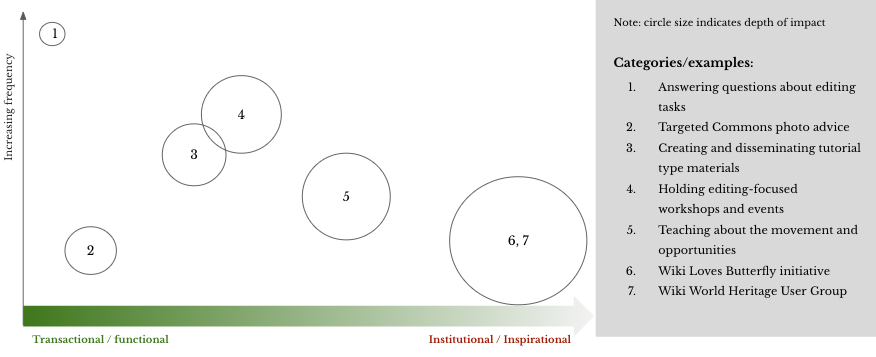
- Answering questions about editing tasks. This could be on a one-off or an ongoing basis
- Specific, targeted Commons photo advice. A participant brought up this example; this individual received specific, actionable feedback on why photos were not being approved and what it would take for a photo to be approved and even featured
- Creating and disseminating tutorial type materials.
- Holding editing-focused workshops and events.
- Teaching about the movement and opportunities; e.g. Making mentees aware of the larger movement, organizational structures, and providing advice on mentees’ draft proposals for their own projects
- Involving people in a hobby-based campaign; e.g. The Wiki Loves Butterfly initiative involved finding butterfly enthusiasts on social media, motivating them to join wiki, having 1:1 chats with them and meeting in person, showing them commons/uploading/categories and other editing-related tasks, doing/coordinating fieldwork and taking butterfly lifecycle photos, holding photo workshops etc.
- Constant communication and community; e.g. Wiki World Heritage User Group holds workshops and is in constant communication/collaboration. Its engagement plan also includes a skills assessment in which members and newcomers are asked about knowledge on various topics/tools, and where they’d like to learn more. This is used to match people up, invite them to specific topic/tool discussions or sessions, or set up curriculum for planned workshops.
What do participants think could improve mentorship? There is some overlap in suggested solutions here, particularly the suggestion for forum-style, centralized discussion interface and for better documentation of various resources and FAQs. Participant suggestions range from simpler (left/green) to the more complex (right/red).
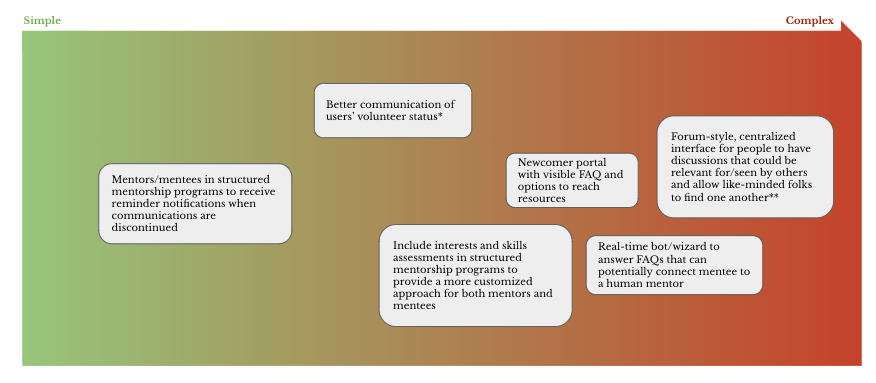
Takeaways
Communications
There are some relatively quicker fixes we can make to make our on wiki communications options more accessible, intuitive, and visible to our community, especially on mobile.
At a higher level, our Product teams need to weigh the pros and cons of making on wiki the go-to place for all wiki-related communications or acknowledge that on wiki is simply not meant to be that type of all-encompassing destination and support off wiki channels where possible.
Other general considerations include device and data limitations many of our community members and potential users face, differing cultural tendencies (e.g, security, privacy, building trust) and community-specific norms around policing, attitudes towards newcomers/anonymous users, etc.
Mentorship
The communications ecosystem’s visibility and functionality are the foundation for mentorship to develop, flourish, and sustain. The functionality aspect should increasingly address not just transactional forms of newcomer help/training (documentation pages, FAQs, bots) but also allow for organic growth of mentorship connections and opportunities.
When mentorship connections do not arise organically, such as in structured newcomer programs, the resulting mentorship interactions tend to remain more transactional in nature and lack an inspirational element that fosters feelings of ownership and more naturally creates opportunities for challenge/reward dynamics to arise. These are factors that tend to establish additional connections, interests, and overall a more prolonged, lasting relationship with the mentor and the movement.
What’s next? Planning, collaboration, evaluation.
Prioritization and planning current/future roadmap. The findings inform ways (and focus areas) in which our Growth team’s Newcomer homepage/tasks initiatives can be improved and supplemented with concurrent efforts. The team can focus on ideation, prioritization, and planning for features in upcoming quarters/annual plans.
Scoping & cross-team collaboration. Other Foundation teams may find this work relevant in their focus areas, both in and outside of Product. There are opportunities for the Growth team to coordinate with other teams (e.g. Editing, Android & iOS, Trust & Safety) on issues impacting communications and mentorship.
Analytics/UX evaluations of Newcomer initiatives. As Growth team’s newcomer initiatives are rolled out on test wikis and perhaps additional wikis, evaluating on an iterative basis how the features are or aren’t meeting the needs of a variety of user personas, using both analytics and usability testing/interviews.
Further strategic research
Additional relevant personas. The next phase of this research should include newcomers and mentees (specific subset of newcomers) more specifically. This will provide first-hand knowledge of how those first experiencing communications related to the wikis become aware of the variety of channels, their expectations and the realities, and their experiences of the newcomer initiatives and interactions with experienced users (in a general or specifically mentorship-type capacity) in these spaces.
Specific communities. Further research should include communities with limited device and connectivity and also cultural concerns whereby trust is primarily built through in-person connections to see what support possibilities exist.
